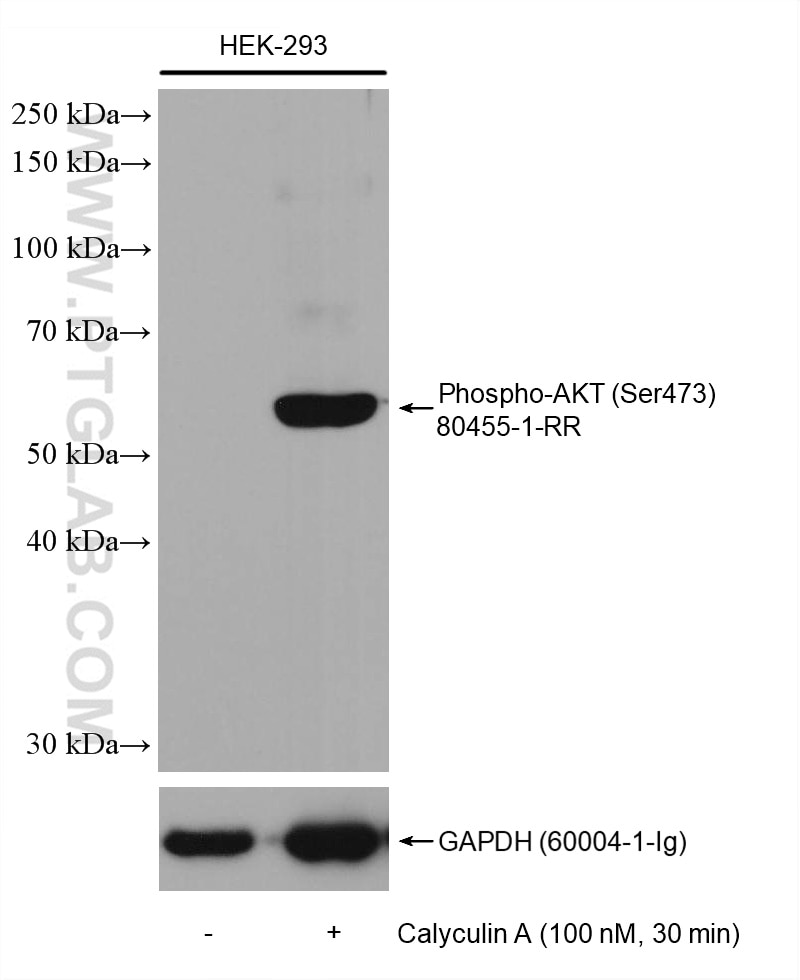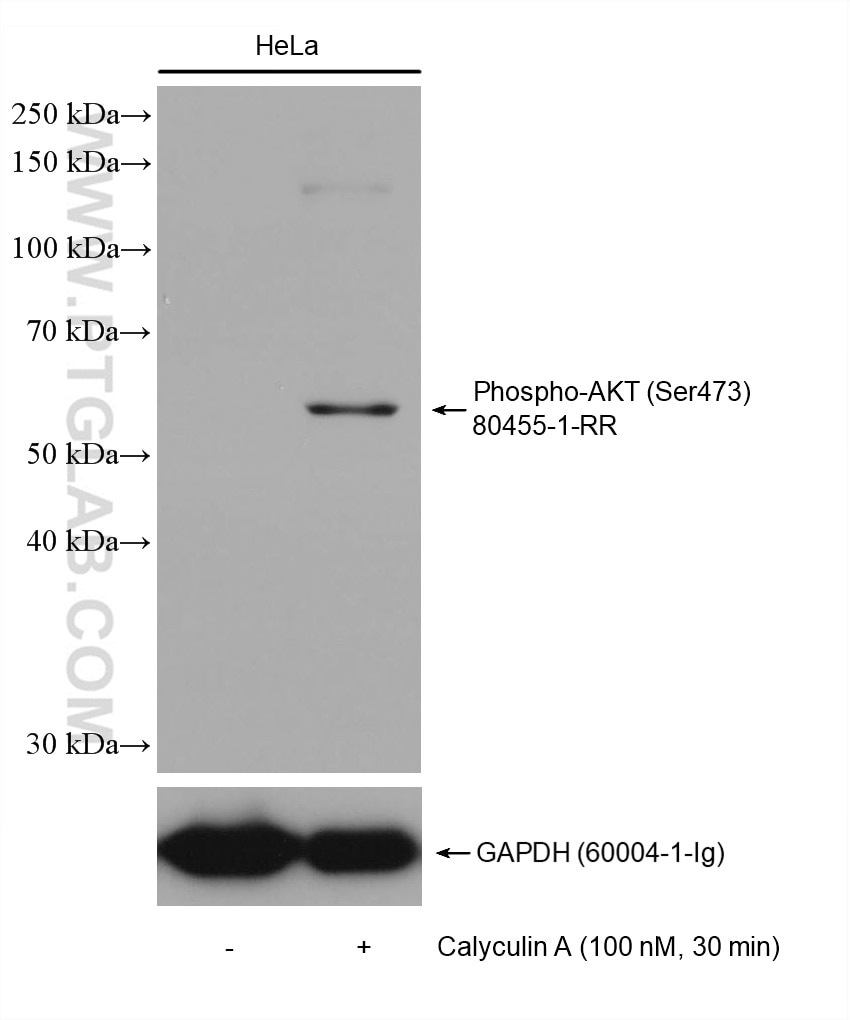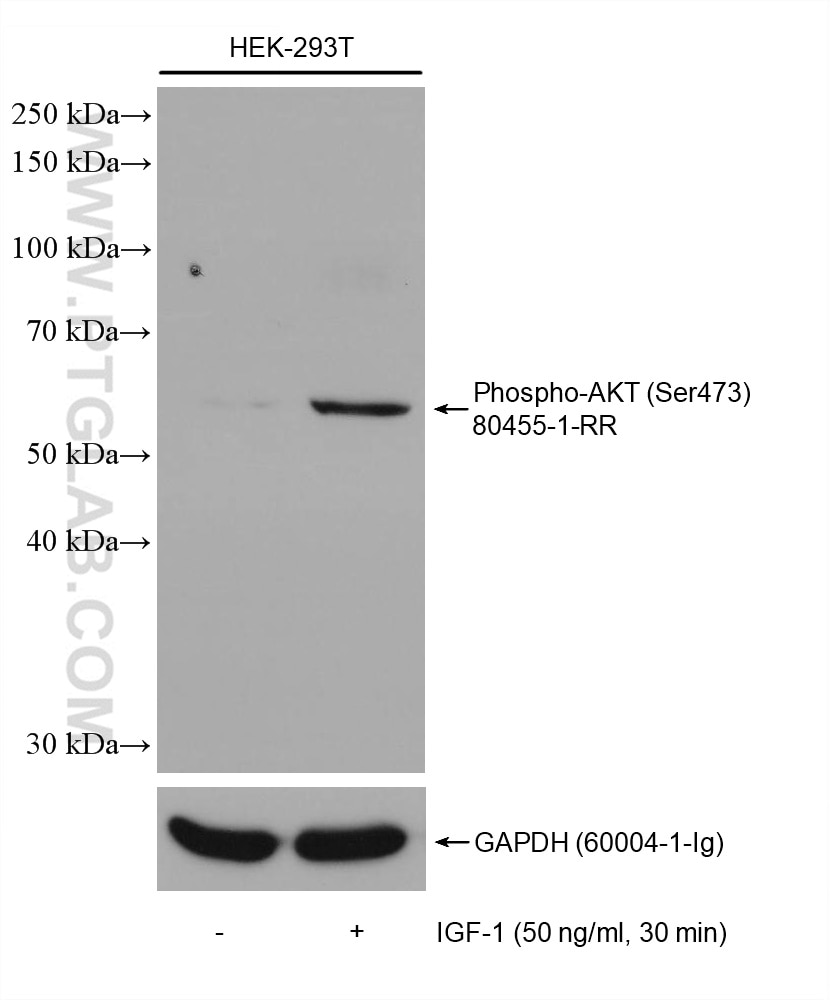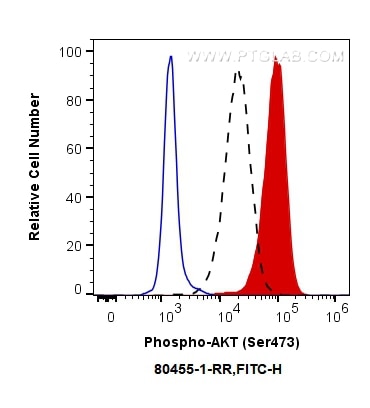Phospho-AKT (Ser473) Rekombinanter Antikörper
Phospho-AKT (Ser473) Rekombinant Antikörper für FC, WB, ELISA
Wirt / Isotyp
Kaninchen / IgG
Getestete Reaktivität
human und mehr (2)
Anwendung
WB, IHC, IF, FC, ELISA
Konjugation
Unkonjugiert
CloneNo.
2E17
Kat-Nr. : 80455-1-RR
Synonyme
Galerie der Validierungsdaten
Geprüfte Anwendungen
| Erfolgreiche Detektion in WB | HEK-293-Zellen, HEK-293T-Zellen, HeLa-Zellen, Mit Calyculin A behandelte HEK-293-Zellen, Mit Calyculin A behandelte HeLa-Zellen, mit IGF-1 behandelte HEK-293T-Zellen |
| Erfolgreiche Detektion in FC | Mit Calyculin A behandelte HEK-293-Zellen |
Empfohlene Verdünnung
| Anwendung | Verdünnung |
|---|---|
| Western Blot (WB) | WB : 1:5000-1:50000 |
| Durchflusszytometrie (FC) | FC : 0.25 ug per 10^6 cells in a 100 µl suspension |
| It is recommended that this reagent should be titrated in each testing system to obtain optimal results. | |
| Sample-dependent, check data in validation data gallery | |
Veröffentlichte Anwendungen
| WB | See 45 publications below |
| IHC | See 1 publications below |
| IF | See 1 publications below |
Produktinformation
80455-1-RR bindet in WB, IHC, IF, FC, ELISA Phospho-AKT (Ser473) und zeigt Reaktivität mit human
| Getestete Reaktivität | human |
| In Publikationen genannte Reaktivität | human, Maus, Ratte |
| Wirt / Isotyp | Kaninchen / IgG |
| Klonalität | Rekombinant |
| Typ | Antikörper |
| Immunogen | Peptid |
| Vollständiger Name | v-akt murine thymoma viral oncogene homolog 1 |
| Beobachtetes Molekulargewicht | 58 kDa |
| GenBank-Zugangsnummer | NM_005163 |
| Gene symbol | AKT1 |
| Gene ID (NCBI) | 207 |
| Konjugation | Unkonjugiert |
| Form | Liquid |
| Reinigungsmethode | Protein-A-Reinigung |
| Lagerungspuffer | PBS mit 0.02% Natriumazid und 50% Glycerin pH 7.3. |
| Lagerungsbedingungen | Bei -20°C lagern. Nach dem Versand ein Jahr lang stabil Aliquotieren ist bei -20oC Lagerung nicht notwendig. 20ul Größen enthalten 0,1% BSA. |
Hintergrundinformationen
AKT is a serine/threonine kinase and it participates in the key role of the PI3K signaling pathway. Phosphatidylinositol-3 kinase (PI3K) is the key regulator of AKT activation. The recruitment of inactive AKT protein to PIP3-rich areas of the plasma membrane results in a conformational change that exposes the activation loop of AKT. AKT's activating kinase, phosphoinositide-dependent protein kinase (PDK1) , is also recruited to PIP3 microdomains. PDK1 phosphorylates AKT on threonine 308 (Thr308) of the exposed activation loop, activating AKT and leading to a second phosphorylation of AKT at serine 473 (Ser473) by a kinase presumed to be mTORC2 that further potentiates kinase activity. Active AKT will phosphorylate various downstream protein targets that control cell growth and translational control and act to suppress apoptosis. (PMID: 31594388, PMID: 30808672)
Protokolle
| Produktspezifische Protokolle | |
|---|---|
| WB protocol for Phospho-AKT (Ser473) antibody 80455-1-RR | Protokoll herunterladen |
| Standard-Protokolle | |
|---|---|
| Klicken Sie hier, um unsere Standardprotokolle anzuzeigen |
Publikationen
| Species | Application | Title |
|---|---|---|
Adv Healthc Mater A ROS-Responsive Liposomal Composite Hydrogel Integrating Improved Mitochondrial Function and Pro-Angiogenesis for Efficient Treatment of Myocardial Infarction. | ||
Research (Wash D C) Herpetrione, a New Type of PPARα Ligand as a Therapeutic Strategy Against Nonalcoholic Steatohepatitis | ||
Arch Pharm Res Selumetinib overcomes gefitinib primary and acquired resistance by regulating MIG6/STAT3 in NSCLC | ||
iScience WIPF1 promotes gastric cancer progression by regulating PI3K/Akt signaling in a myocardin-dependent manner | ||
Int J Mol Sci Identification of Potential Mechanisms of Rk1 Combination with Rg5 in the Treatment of Type II Diabetes Mellitus by Integrating Network Pharmacology and Experimental Validation | ||
J Cell Mol Med Irreversible repolarization of tumour-associated macrophages by low-Pi stress inhibits the progression of hepatocellular carcinoma |





